Unit 9 Have you ever been to a museum单元复习练习(含解析)人教版八年级英语下册
文档属性
| 名称 | Unit 9 Have you ever been to a museum单元复习练习(含解析)人教版八年级英语下册 |
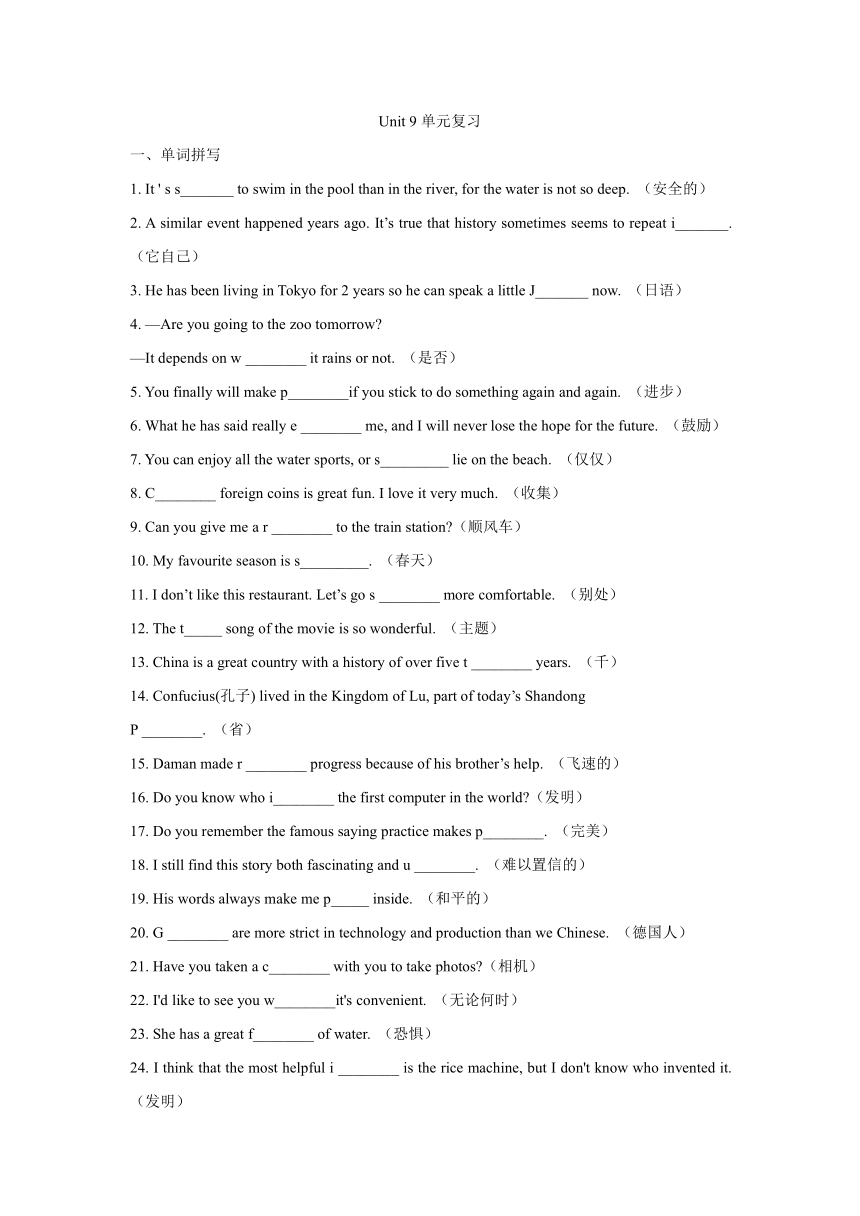
|
|
| 格式 | docx | ||
| 文件大小 | 32.8KB | ||
| 资源类型 | 教案 | ||
| 版本资源 | 人教新目标(Go for it)版 | ||
| 科目 | 英语 | ||
| 更新时间 | 2025-02-26 14:49:28 | ||
图片预览

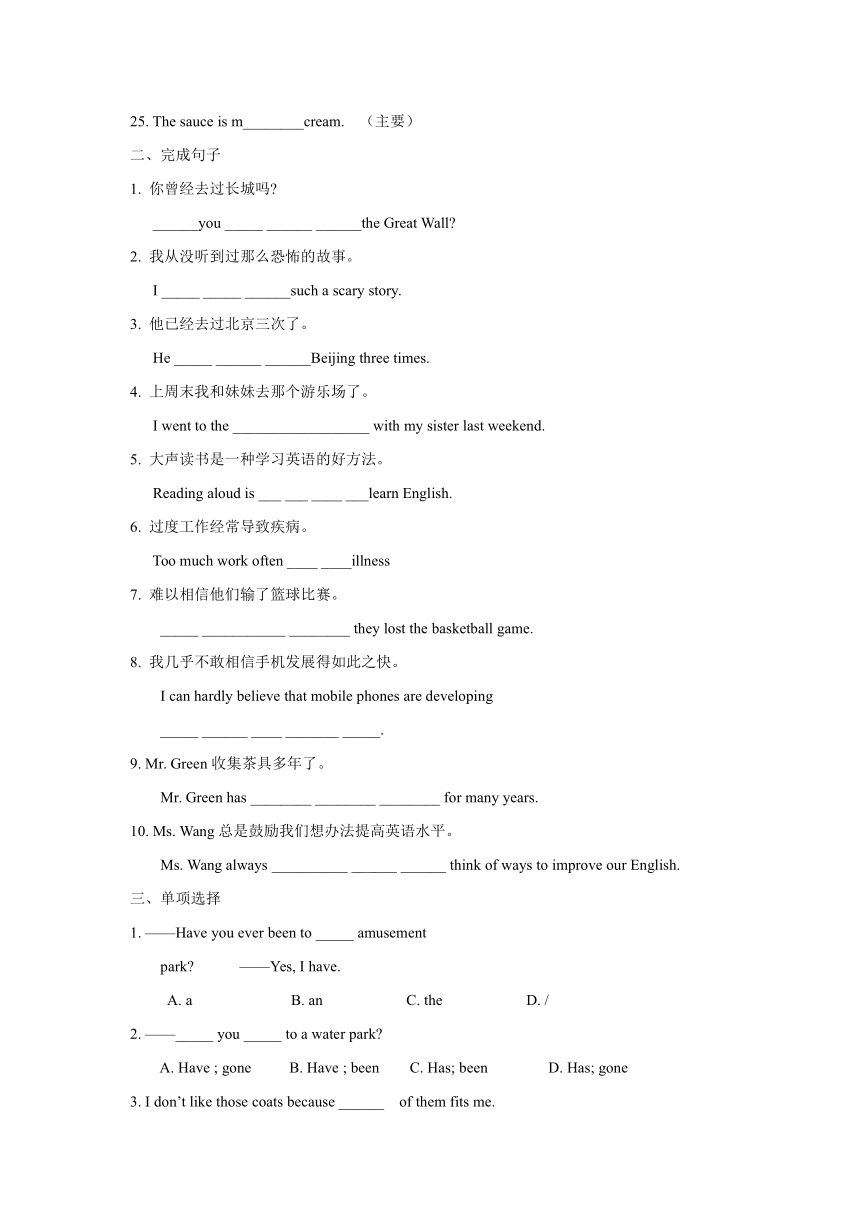
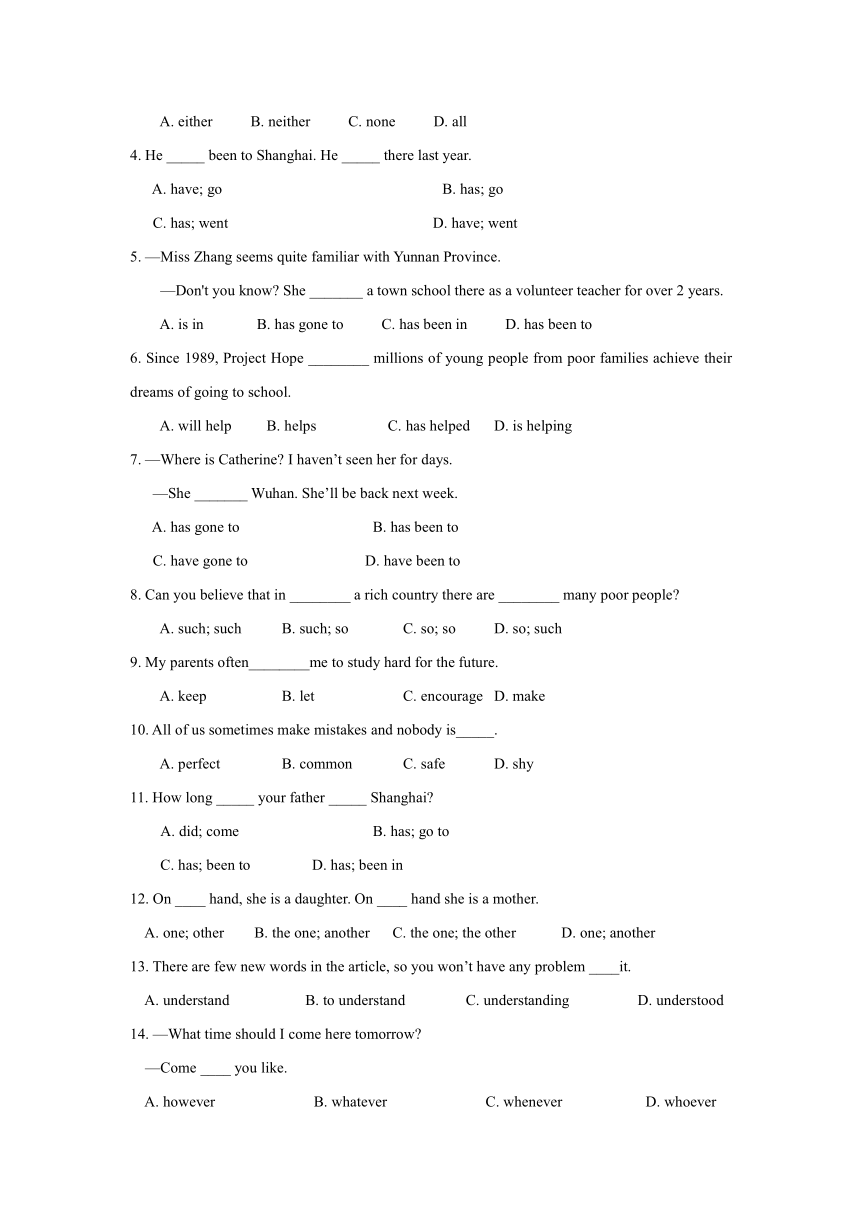
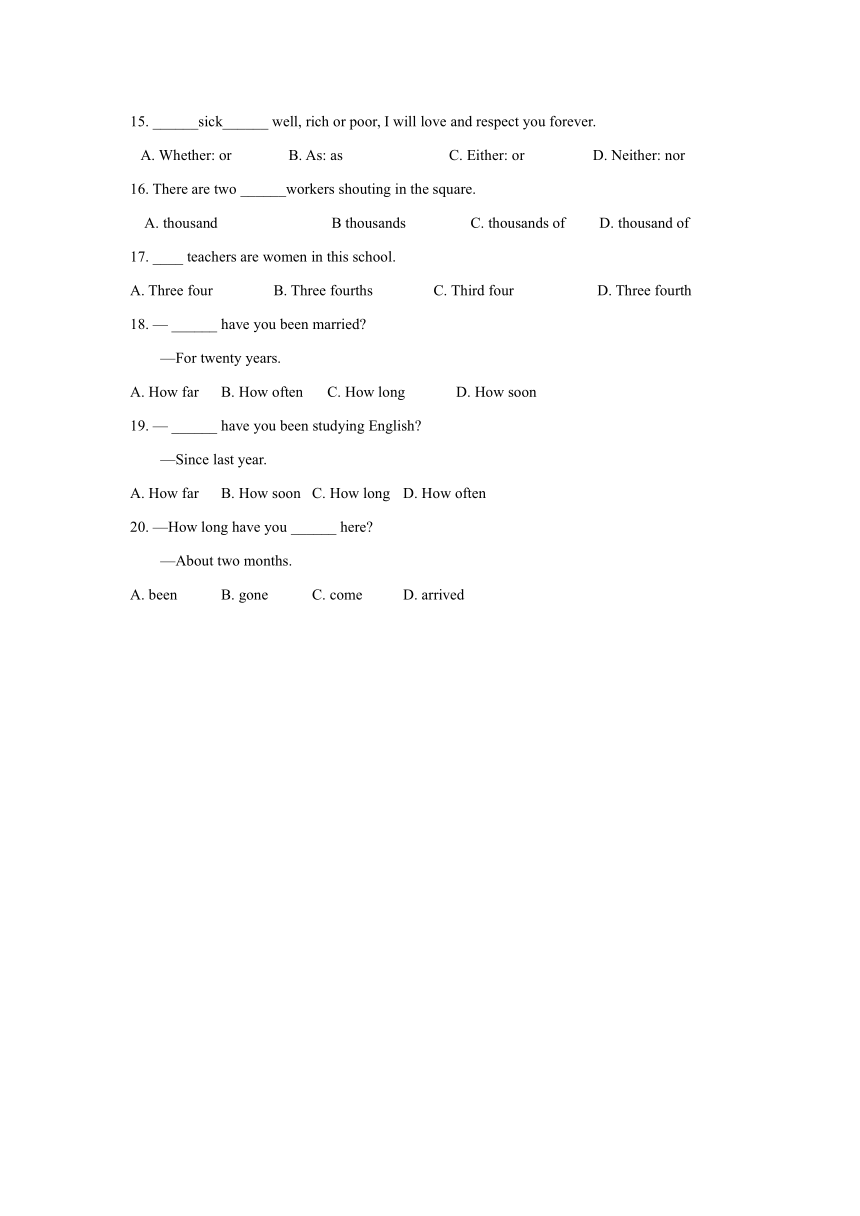
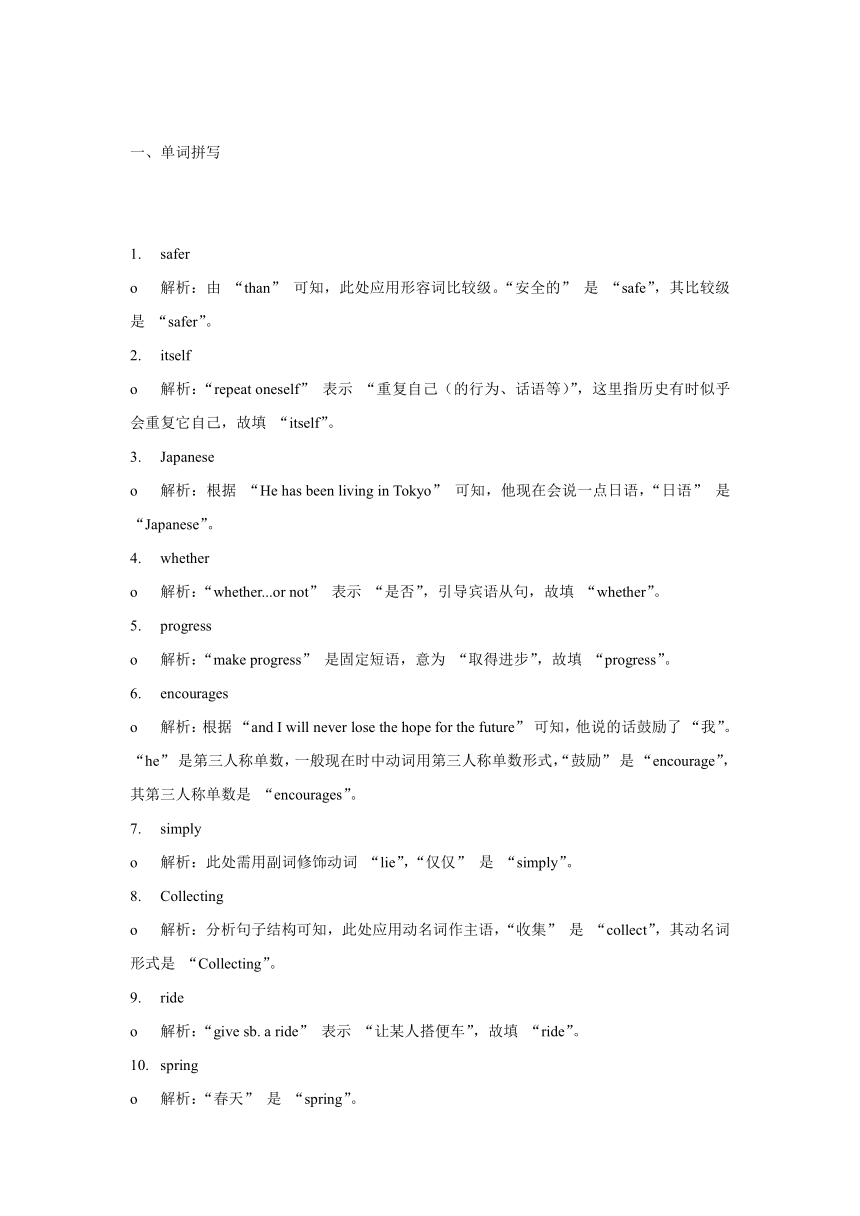
文档简介
Unit 9单元复习
一、单词拼写
1. It ' s s_______ to swim in the pool than in the river, for the water is not so deep. (安全的)
2. A similar event happened years ago. It’s true that history sometimes seems to repeat i_______. (它自己)
3. He has been living in Tokyo for 2 years so he can speak a little J_______ now. (日语)
4. —Are you going to the zoo tomorrow
—It depends on w ________ it rains or not. (是否)
5. You finally will make p________if you stick to do something again and again. (进步)
6. What he has said really e ________ me, and I will never lose the hope for the future. (鼓励)
7. You can enjoy all the water sports, or s_________ lie on the beach. (仅仅)
8. C________ foreign coins is great fun. I love it very much. (收集)
9. Can you give me a r ________ to the train station (顺风车)
10. My favourite season is s_________. (春天)
11. I don’t like this restaurant. Let’s go s ________ more comfortable. (别处)
12. The t_____ song of the movie is so wonderful. (主题)
13. China is a great country with a history of over five t ________ years. (千)
14. Confucius(孔子) lived in the Kingdom of Lu, part of today’s Shandong
P ________. (省)
15. Daman made r ________ progress because of his brother’s help. (飞速的)
16. Do you know who i________ the first computer in the world (发明)
17. Do you remember the famous saying practice makes p________. (完美)
18. I still find this story both fascinating and u ________. (难以置信的)
19. His words always make me p_____ inside. (和平的)
20. G ________ are more strict in technology and production than we Chinese. (德国人)
21. Have you taken a c________ with you to take photos (相机)
22. I'd like to see you w________it's convenient. (无论何时)
23. She has a great f________ of water. (恐惧)
24. I think that the most helpful i ________ is the rice machine, but I don't know who invented it. (发明)
25. The sauce is m________cream. (主要)
二、完成句子
1. 你曾经去过长城吗
______you _____ ______ ______the Great Wall
2. 我从没听到过那么恐怖的故事。
I _____ _____ ______such a scary story.
3. 他已经去过北京三次了。
He _____ ______ ______Beijing three times.
4. 上周末我和妹妹去那个游乐场了。
I went to the __________________ with my sister last weekend.
5. 大声读书是一种学习英语的好方法。
Reading aloud is ___ ___ ____ ___learn English.
6. 过度工作经常导致疾病。
Too much work often ____ ____illness
7. 难以相信他们输了篮球比赛。
_____ ___________ ________ they lost the basketball game.
8. 我几乎不敢相信手机发展得如此之快。
I can hardly believe that mobile phones are developing
_____ ______ ____ _______ _____.
9. Mr. Green收集茶具多年了。
Mr. Green has ________ ________ ________ for many years.
10. Ms. Wang总是鼓励我们想办法提高英语水平。
Ms. Wang always __________ ______ ______ think of ways to improve our English.
三、单项选择
1. ——Have you ever been to _____ amusement
park ——Yes, I have.
A. a B. an C. the D. /
2. ——_____ you _____ to a water park
A. Have ; gone B. Have ; been C. Has; been D. Has; gone
3. I don’t like those coats because ______ of them fits me.
A. either B. neither C. none D. all
4. He _____ been to Shanghai. He _____ there last year.
A. have; go B. has; go
C. has; went D. have; went
5. —Miss Zhang seems quite familiar with Yunnan Province.
—Don't you know She _______ a town school there as a volunteer teacher for over 2 years.
A. is in B. has gone to C. has been in D. has been to
6. Since 1989, Project Hope ________ millions of young people from poor families achieve their dreams of going to school.
A. will help B. helps C. has helped D. is helping
7. —Where is Catherine I haven’t seen her for days.
—She _______ Wuhan. She’ll be back next week.
A. has gone to B. has been to
C. have gone to D. have been to
8. Can you believe that in ________ a rich country there are ________ many poor people
A. such; such B. such; so C. so; so D. so; such
9. My parents often________me to study hard for the future.
A. keep B. let C. encourage D. make
10. All of us sometimes make mistakes and nobody is_____.
A. perfect B. common C. safe D. shy
11. How long _____ your father _____ Shanghai
A. did; come B. has; go to
C. has; been to D. has; been in
12. On ____ hand, she is a daughter. On ____ hand she is a mother.
A. one; other B. the one; another C. the one; the other D. one; another
13. There are few new words in the article, so you won’t have any problem ____it.
A. understand B. to understand C. understanding D. understood
14. —What time should I come here tomorrow
—Come ____ you like.
A. however B. whatever C. whenever D. whoever
15. ______sick______ well, rich or poor, I will love and respect you forever.
A. Whether: or B. As: as C. Either: or D. Neither: nor
16. There are two ______workers shouting in the square.
A. thousand B thousands C. thousands of D. thousand of
17. ____ teachers are women in this school.
A. Three four B. Three fourths C. Third four D. Three fourth
18. — ______ have you been married
—For twenty years.
A. How far B. How often C. How long D. How soon
19. — ______ have you been studying English
—Since last year.
A. How far B. How soon C. How long D. How often
20. —How long have you ______ here
—About two months.
A. been B. gone C. come D. arrived
一、单词拼写
1. safer
o 解析:由 “than” 可知,此处应用形容词比较级。“安全的” 是 “safe”,其比较级是 “safer”。
2. itself
o 解析:“repeat oneself” 表示 “重复自己(的行为、话语等)”,这里指历史有时似乎会重复它自己,故填 “itself”。
3. Japanese
o 解析:根据 “He has been living in Tokyo” 可知,他现在会说一点日语,“日语” 是 “Japanese”。
4. whether
o 解析:“whether...or not” 表示 “是否”,引导宾语从句,故填 “whether”。
5. progress
o 解析:“make progress” 是固定短语,意为 “取得进步”,故填 “progress”。
6. encourages
o 解析:根据 “and I will never lose the hope for the future” 可知,他说的话鼓励了 “我”。“he” 是第三人称单数,一般现在时中动词用第三人称单数形式,“鼓励” 是 “encourage”,其第三人称单数是 “encourages”。
7. simply
o 解析:此处需用副词修饰动词 “lie”,“仅仅” 是 “simply”。
8. Collecting
o 解析:分析句子结构可知,此处应用动名词作主语,“收集” 是 “collect”,其动名词形式是 “Collecting”。
9. ride
o 解析:“give sb. a ride” 表示 “让某人搭便车”,故填 “ride”。
10. spring
o 解析:“春天” 是 “spring”。
11. somewhere
o 解析:根据 “I don’t like this restaurant.” 可知,想去更舒适的别的地方,“别处” 是 “somewhere”。
12. theme
o 解析:“主题歌曲” 是 “theme song”,故填 “theme”。
13. thousand
o 解析:“five thousand years” 表示 “五千年”,“thousand” 前有具体数字时,用单数形式,故填 “thousand”。
14. Province
o 解析:“Shandong Province” 表示 “山东省”,“Province” 首字母要大写,故填 “Province”。
15. rapid
o 解析:“progress” 是名词,前面用形容词修饰,“飞速的” 是 “rapid”,故填 “rapid”。
16. invented
o 解析:“谁发明了世界上第一台电脑”,该动作发生在过去,用一般过去时,“发明” 是 “invent”,其过去式是 “invented”。
17. perfect
o 解析:“Practice makes perfect.” 是谚语,意为 “熟能生巧”,故填 “perfect”。
18. unbelievable
o 解析:“and” 连接两个并列的形容词,“难以置信的” 是 “unbelievable”。
19. peaceful
o 解析:“make sb. + 形容词” 表示 “使某人处于某种状态”,“和平的” 是 “peaceful”。
20. Germans
o 解析:“德国人” 是 “German”,根据 “are” 可知,此处用复数形式 “Germans”。
21. camera
o 解析:“take a camera” 表示 “带相机”,故填 “camera”。
22. whenever
o 解析:“whenever” 表示 “无论何时”,引导时间状语从句,故填 “whenever”。
23. fear
o 解析:“have a great fear of” 表示 “非常害怕……”,故填 “fear”。
24. invention
o 解析:“the most helpful” 后面接名词,“发明” 是 “invention”。
25. mostly
o 解析:此处需用副词修饰动词 “is”,“主要” 是 “mostly”。
二、完成句子
1. Have; ever been to
o 解析:“Have you ever been to...” 表示 “你曾经去过…… 吗”,是现在完成时的一般疑问句结构。
2. have never heard
o 解析:“从没听到过” 用现在完成时的否定形式,“hear” 的过去分词是 “heard”,故填 “have never heard”。
3. has already been to
o 解析:“已经去过” 用现在完成时,“he” 是第三人称单数,用 “has”,“already” 可用于肯定句中表示 “已经”,故填 “has already been to”。
4. amusement park
o 解析:“游乐场” 是 “amusement park”。
5. a good way to
o 解析:“a good way to do sth.” 表示 “做某事的好方法”,故填 “a good way to”。
6. leads to
o 解析:“lead to” 表示 “导致”,“Too much work” 是第三人称单数,一般现在时中动词用第三人称单数形式,“lead” 的第三人称单数是 “leads”,故填 “leads to”。
7. It’s unbelievable that
o 解析:“It’s + 形容词 + that 从句” 是固定句型,“难以相信的” 是 “unbelievable”,故填 “It’s unbelievable that”。
8. so quickly that it’s hard to believe
o 解析:“so...that...” 表示 “如此…… 以至于……”,“发展得如此之快以至于难以相信” 可表达为 “develop so quickly that it’s hard to believe”,故填 “so quickly that it’s hard to believe”。
9. collected tea sets
o 解析:“收集茶具” 是 “collect tea sets”,“has” 表明句子是现在完成时,“collect” 的过去分词是 “collected”,故填 “collected tea sets”。
10. encourages us to
o 解析:“encourage sb. to do sth.” 表示 “鼓励某人做某事”,“Ms. Wang” 是第三人称单数,一般现在时中动词用第三人称单数形式,“encourage” 的第三人称单数是 “encourages”,故填 “encourages us to”。
三、单项选择
1. B
o 解析:“amusement” 是以元音音素开头的单词,“一个游乐园” 用 “an amusement park”,故选 B。
2. B
o 解析:“have/has been to” 表示 “去过某地(已经回来)”;“have/has gone to” 表示 “去了某地(还未回来)”。这里询问是否去过水上公园,用 “have/has been to”,“you” 用 “have”,故选 B。
3. C
o 解析:A 选项 “either” 表示 “两者中的任何一个”;B 选项 “neither” 表示 “两者都不”;C 选项 “none” 表示 “三者或三者以上都不”;D 选项 “all” 表示 “三者或三者以上都”。根据 “I don’t like those coats” 可知,那些外套都不适合 “我”,这里指三者或三者以上,故选 C。
4. C
o 解析:“he” 是第三人称单数,现在完成时中用 “has”;“last year” 是一般过去时的标志,“go” 的过去式是 “went”,故选 C。
5. C
o 解析:“for over 2 years” 表示一段时间,用现在完成时,“be in” 表示 “在某地待了多长时间”,“she” 是第三人称单数,用 “has been in”,故选 C。
6. C
o 解析:“Since 1989” 是现在完成时的标志,其结构是 “have/has + 过去分词”,“Project Hope” 是第三人称单数,用 “has helped”,故选 C。
7. A
o 解析:“She’ll be back next week.” 说明她去了武汉还没回来,用 “has gone to”,“she” 是第三人称单数,故选 A。
8. B
o 解析:“such + (a/an) + 形容词 + 可数名词单数 / 复数 / 不可数名词”;“so + 形容词 / 副词”,当名词前有 “many”“much”“few”“little” 等词修饰时,用 “so”。“a rich country” 用 “such” 修饰;“many poor people” 用 “so” 修饰,故选 B。
9. C
o 解析:A 选项 “keep” 表示 “保持”;B 选项 “let” 表示 “让”;C 选项 “encourage” 表示 “鼓励”;D 选项 “make” 表示 “使,让”。“encourage sb. to do sth.” 是固定用法,意为 “鼓励某人做某事”,故选 C。
10. A
o 解析:A 选项 “perfect” 表示 “完美的”;B 选项 “common” 表示 “普通的”;C 选项 “safe” 表示 “安全的”;D 选项 “shy” 表示 “害羞的”。根据 “All of us sometimes make mistakes” 可知,没有人是完美的,故选 A。
11. D
o 解析:“How long” 询问一段时间,用现在完成时,“come”“go”“arrive” 都是短暂性动词,不能和一段时间连用,“be in” 表示 “在某地待了多长时间”,可以和一段时间连用,“your father” 是第三人称单数,用 “has been in”,故选 D。
12. C
o 解析:“on the one hand...on the other hand...” 表示 “一方面…… 另一方面……”,是固定短语,故选 C。
13. C
o 解析:“have problem (in) doing sth.” 表示 “做某事有困难”,“in” 可以省略,故选 C。
14. C
o 解析:A 选项 “however” 表示 “无论怎样”;B 选项 “whatever” 表示 “无论什么”;C 选项 “whenever” 表示 “无论何时”;D 选项 “whoever” 表示 “无论谁”。根据 “Come” 可知,是让对方无论何时想来都可以,故选 C。
15. A
o 解析:A 选项 “Whether...or...” 表示 “无论…… 还是……”;B 选项 “As...as...” 表示 “和…… 一样”;C 选项 “Either...or...” 表示 “要么…… 要么……”;D 选项 “Neither...nor...” 表示 “既不…… 也不……”。根据 “rich or poor, I will love and respect you forever” 可知,这里用 “Whether...or...”,故选 A。
16. A
o 解析:“thousand” 前有具体数字时,用单数形式,后面不加 “s” 和 “of”,“two thousand workers” 表示 “两千名工人”,故选 A。
17. B
o 解析:分数的表达方法是:分子用基数词,分母用序数词,当分子大于 1 时,分母用复数形式。“四分之三” 是 “Three fourths”,故选 B。
18. C
o 解析:A 选项 “How far” 表示 “多远”;B 选项 “How often” 表示 “多久一次”;C 选项 “How long” 表示 “多长时间”;D 选项 “How soon” 表示 “多久以后”。根据 “For twenty years” 可知,询问结婚多长时间了,用 “How long”,故选 C。
19. C
o 解析:A 选项 “How far” 表示 “多远”;B 选项 “How soon” 表示 “多久以后”;C 选项 “How long” 表示 “多长时间”;D 选项 “How often” 表示 “多久一次”。根据 “Since last year” 可知,询问学习英语多长时间了,用 “How long”,故选 C。
20. A
o 解析:“How long” 询问一段时间,用现在完成时,“go”“come”“arrive” 都是短暂性动词,不能和一段时间连用,“be” 是延续性动词,可以和一段时间连用,故选 A。
一、单词拼写
1. It ' s s_______ to swim in the pool than in the river, for the water is not so deep. (安全的)
2. A similar event happened years ago. It’s true that history sometimes seems to repeat i_______. (它自己)
3. He has been living in Tokyo for 2 years so he can speak a little J_______ now. (日语)
4. —Are you going to the zoo tomorrow
—It depends on w ________ it rains or not. (是否)
5. You finally will make p________if you stick to do something again and again. (进步)
6. What he has said really e ________ me, and I will never lose the hope for the future. (鼓励)
7. You can enjoy all the water sports, or s_________ lie on the beach. (仅仅)
8. C________ foreign coins is great fun. I love it very much. (收集)
9. Can you give me a r ________ to the train station (顺风车)
10. My favourite season is s_________. (春天)
11. I don’t like this restaurant. Let’s go s ________ more comfortable. (别处)
12. The t_____ song of the movie is so wonderful. (主题)
13. China is a great country with a history of over five t ________ years. (千)
14. Confucius(孔子) lived in the Kingdom of Lu, part of today’s Shandong
P ________. (省)
15. Daman made r ________ progress because of his brother’s help. (飞速的)
16. Do you know who i________ the first computer in the world (发明)
17. Do you remember the famous saying practice makes p________. (完美)
18. I still find this story both fascinating and u ________. (难以置信的)
19. His words always make me p_____ inside. (和平的)
20. G ________ are more strict in technology and production than we Chinese. (德国人)
21. Have you taken a c________ with you to take photos (相机)
22. I'd like to see you w________it's convenient. (无论何时)
23. She has a great f________ of water. (恐惧)
24. I think that the most helpful i ________ is the rice machine, but I don't know who invented it. (发明)
25. The sauce is m________cream. (主要)
二、完成句子
1. 你曾经去过长城吗
______you _____ ______ ______the Great Wall
2. 我从没听到过那么恐怖的故事。
I _____ _____ ______such a scary story.
3. 他已经去过北京三次了。
He _____ ______ ______Beijing three times.
4. 上周末我和妹妹去那个游乐场了。
I went to the __________________ with my sister last weekend.
5. 大声读书是一种学习英语的好方法。
Reading aloud is ___ ___ ____ ___learn English.
6. 过度工作经常导致疾病。
Too much work often ____ ____illness
7. 难以相信他们输了篮球比赛。
_____ ___________ ________ they lost the basketball game.
8. 我几乎不敢相信手机发展得如此之快。
I can hardly believe that mobile phones are developing
_____ ______ ____ _______ _____.
9. Mr. Green收集茶具多年了。
Mr. Green has ________ ________ ________ for many years.
10. Ms. Wang总是鼓励我们想办法提高英语水平。
Ms. Wang always __________ ______ ______ think of ways to improve our English.
三、单项选择
1. ——Have you ever been to _____ amusement
park ——Yes, I have.
A. a B. an C. the D. /
2. ——_____ you _____ to a water park
A. Have ; gone B. Have ; been C. Has; been D. Has; gone
3. I don’t like those coats because ______ of them fits me.
A. either B. neither C. none D. all
4. He _____ been to Shanghai. He _____ there last year.
A. have; go B. has; go
C. has; went D. have; went
5. —Miss Zhang seems quite familiar with Yunnan Province.
—Don't you know She _______ a town school there as a volunteer teacher for over 2 years.
A. is in B. has gone to C. has been in D. has been to
6. Since 1989, Project Hope ________ millions of young people from poor families achieve their dreams of going to school.
A. will help B. helps C. has helped D. is helping
7. —Where is Catherine I haven’t seen her for days.
—She _______ Wuhan. She’ll be back next week.
A. has gone to B. has been to
C. have gone to D. have been to
8. Can you believe that in ________ a rich country there are ________ many poor people
A. such; such B. such; so C. so; so D. so; such
9. My parents often________me to study hard for the future.
A. keep B. let C. encourage D. make
10. All of us sometimes make mistakes and nobody is_____.
A. perfect B. common C. safe D. shy
11. How long _____ your father _____ Shanghai
A. did; come B. has; go to
C. has; been to D. has; been in
12. On ____ hand, she is a daughter. On ____ hand she is a mother.
A. one; other B. the one; another C. the one; the other D. one; another
13. There are few new words in the article, so you won’t have any problem ____it.
A. understand B. to understand C. understanding D. understood
14. —What time should I come here tomorrow
—Come ____ you like.
A. however B. whatever C. whenever D. whoever
15. ______sick______ well, rich or poor, I will love and respect you forever.
A. Whether: or B. As: as C. Either: or D. Neither: nor
16. There are two ______workers shouting in the square.
A. thousand B thousands C. thousands of D. thousand of
17. ____ teachers are women in this school.
A. Three four B. Three fourths C. Third four D. Three fourth
18. — ______ have you been married
—For twenty years.
A. How far B. How often C. How long D. How soon
19. — ______ have you been studying English
—Since last year.
A. How far B. How soon C. How long D. How often
20. —How long have you ______ here
—About two months.
A. been B. gone C. come D. arrived
一、单词拼写
1. safer
o 解析:由 “than” 可知,此处应用形容词比较级。“安全的” 是 “safe”,其比较级是 “safer”。
2. itself
o 解析:“repeat oneself” 表示 “重复自己(的行为、话语等)”,这里指历史有时似乎会重复它自己,故填 “itself”。
3. Japanese
o 解析:根据 “He has been living in Tokyo” 可知,他现在会说一点日语,“日语” 是 “Japanese”。
4. whether
o 解析:“whether...or not” 表示 “是否”,引导宾语从句,故填 “whether”。
5. progress
o 解析:“make progress” 是固定短语,意为 “取得进步”,故填 “progress”。
6. encourages
o 解析:根据 “and I will never lose the hope for the future” 可知,他说的话鼓励了 “我”。“he” 是第三人称单数,一般现在时中动词用第三人称单数形式,“鼓励” 是 “encourage”,其第三人称单数是 “encourages”。
7. simply
o 解析:此处需用副词修饰动词 “lie”,“仅仅” 是 “simply”。
8. Collecting
o 解析:分析句子结构可知,此处应用动名词作主语,“收集” 是 “collect”,其动名词形式是 “Collecting”。
9. ride
o 解析:“give sb. a ride” 表示 “让某人搭便车”,故填 “ride”。
10. spring
o 解析:“春天” 是 “spring”。
11. somewhere
o 解析:根据 “I don’t like this restaurant.” 可知,想去更舒适的别的地方,“别处” 是 “somewhere”。
12. theme
o 解析:“主题歌曲” 是 “theme song”,故填 “theme”。
13. thousand
o 解析:“five thousand years” 表示 “五千年”,“thousand” 前有具体数字时,用单数形式,故填 “thousand”。
14. Province
o 解析:“Shandong Province” 表示 “山东省”,“Province” 首字母要大写,故填 “Province”。
15. rapid
o 解析:“progress” 是名词,前面用形容词修饰,“飞速的” 是 “rapid”,故填 “rapid”。
16. invented
o 解析:“谁发明了世界上第一台电脑”,该动作发生在过去,用一般过去时,“发明” 是 “invent”,其过去式是 “invented”。
17. perfect
o 解析:“Practice makes perfect.” 是谚语,意为 “熟能生巧”,故填 “perfect”。
18. unbelievable
o 解析:“and” 连接两个并列的形容词,“难以置信的” 是 “unbelievable”。
19. peaceful
o 解析:“make sb. + 形容词” 表示 “使某人处于某种状态”,“和平的” 是 “peaceful”。
20. Germans
o 解析:“德国人” 是 “German”,根据 “are” 可知,此处用复数形式 “Germans”。
21. camera
o 解析:“take a camera” 表示 “带相机”,故填 “camera”。
22. whenever
o 解析:“whenever” 表示 “无论何时”,引导时间状语从句,故填 “whenever”。
23. fear
o 解析:“have a great fear of” 表示 “非常害怕……”,故填 “fear”。
24. invention
o 解析:“the most helpful” 后面接名词,“发明” 是 “invention”。
25. mostly
o 解析:此处需用副词修饰动词 “is”,“主要” 是 “mostly”。
二、完成句子
1. Have; ever been to
o 解析:“Have you ever been to...” 表示 “你曾经去过…… 吗”,是现在完成时的一般疑问句结构。
2. have never heard
o 解析:“从没听到过” 用现在完成时的否定形式,“hear” 的过去分词是 “heard”,故填 “have never heard”。
3. has already been to
o 解析:“已经去过” 用现在完成时,“he” 是第三人称单数,用 “has”,“already” 可用于肯定句中表示 “已经”,故填 “has already been to”。
4. amusement park
o 解析:“游乐场” 是 “amusement park”。
5. a good way to
o 解析:“a good way to do sth.” 表示 “做某事的好方法”,故填 “a good way to”。
6. leads to
o 解析:“lead to” 表示 “导致”,“Too much work” 是第三人称单数,一般现在时中动词用第三人称单数形式,“lead” 的第三人称单数是 “leads”,故填 “leads to”。
7. It’s unbelievable that
o 解析:“It’s + 形容词 + that 从句” 是固定句型,“难以相信的” 是 “unbelievable”,故填 “It’s unbelievable that”。
8. so quickly that it’s hard to believe
o 解析:“so...that...” 表示 “如此…… 以至于……”,“发展得如此之快以至于难以相信” 可表达为 “develop so quickly that it’s hard to believe”,故填 “so quickly that it’s hard to believe”。
9. collected tea sets
o 解析:“收集茶具” 是 “collect tea sets”,“has” 表明句子是现在完成时,“collect” 的过去分词是 “collected”,故填 “collected tea sets”。
10. encourages us to
o 解析:“encourage sb. to do sth.” 表示 “鼓励某人做某事”,“Ms. Wang” 是第三人称单数,一般现在时中动词用第三人称单数形式,“encourage” 的第三人称单数是 “encourages”,故填 “encourages us to”。
三、单项选择
1. B
o 解析:“amusement” 是以元音音素开头的单词,“一个游乐园” 用 “an amusement park”,故选 B。
2. B
o 解析:“have/has been to” 表示 “去过某地(已经回来)”;“have/has gone to” 表示 “去了某地(还未回来)”。这里询问是否去过水上公园,用 “have/has been to”,“you” 用 “have”,故选 B。
3. C
o 解析:A 选项 “either” 表示 “两者中的任何一个”;B 选项 “neither” 表示 “两者都不”;C 选项 “none” 表示 “三者或三者以上都不”;D 选项 “all” 表示 “三者或三者以上都”。根据 “I don’t like those coats” 可知,那些外套都不适合 “我”,这里指三者或三者以上,故选 C。
4. C
o 解析:“he” 是第三人称单数,现在完成时中用 “has”;“last year” 是一般过去时的标志,“go” 的过去式是 “went”,故选 C。
5. C
o 解析:“for over 2 years” 表示一段时间,用现在完成时,“be in” 表示 “在某地待了多长时间”,“she” 是第三人称单数,用 “has been in”,故选 C。
6. C
o 解析:“Since 1989” 是现在完成时的标志,其结构是 “have/has + 过去分词”,“Project Hope” 是第三人称单数,用 “has helped”,故选 C。
7. A
o 解析:“She’ll be back next week.” 说明她去了武汉还没回来,用 “has gone to”,“she” 是第三人称单数,故选 A。
8. B
o 解析:“such + (a/an) + 形容词 + 可数名词单数 / 复数 / 不可数名词”;“so + 形容词 / 副词”,当名词前有 “many”“much”“few”“little” 等词修饰时,用 “so”。“a rich country” 用 “such” 修饰;“many poor people” 用 “so” 修饰,故选 B。
9. C
o 解析:A 选项 “keep” 表示 “保持”;B 选项 “let” 表示 “让”;C 选项 “encourage” 表示 “鼓励”;D 选项 “make” 表示 “使,让”。“encourage sb. to do sth.” 是固定用法,意为 “鼓励某人做某事”,故选 C。
10. A
o 解析:A 选项 “perfect” 表示 “完美的”;B 选项 “common” 表示 “普通的”;C 选项 “safe” 表示 “安全的”;D 选项 “shy” 表示 “害羞的”。根据 “All of us sometimes make mistakes” 可知,没有人是完美的,故选 A。
11. D
o 解析:“How long” 询问一段时间,用现在完成时,“come”“go”“arrive” 都是短暂性动词,不能和一段时间连用,“be in” 表示 “在某地待了多长时间”,可以和一段时间连用,“your father” 是第三人称单数,用 “has been in”,故选 D。
12. C
o 解析:“on the one hand...on the other hand...” 表示 “一方面…… 另一方面……”,是固定短语,故选 C。
13. C
o 解析:“have problem (in) doing sth.” 表示 “做某事有困难”,“in” 可以省略,故选 C。
14. C
o 解析:A 选项 “however” 表示 “无论怎样”;B 选项 “whatever” 表示 “无论什么”;C 选项 “whenever” 表示 “无论何时”;D 选项 “whoever” 表示 “无论谁”。根据 “Come” 可知,是让对方无论何时想来都可以,故选 C。
15. A
o 解析:A 选项 “Whether...or...” 表示 “无论…… 还是……”;B 选项 “As...as...” 表示 “和…… 一样”;C 选项 “Either...or...” 表示 “要么…… 要么……”;D 选项 “Neither...nor...” 表示 “既不…… 也不……”。根据 “rich or poor, I will love and respect you forever” 可知,这里用 “Whether...or...”,故选 A。
16. A
o 解析:“thousand” 前有具体数字时,用单数形式,后面不加 “s” 和 “of”,“two thousand workers” 表示 “两千名工人”,故选 A。
17. B
o 解析:分数的表达方法是:分子用基数词,分母用序数词,当分子大于 1 时,分母用复数形式。“四分之三” 是 “Three fourths”,故选 B。
18. C
o 解析:A 选项 “How far” 表示 “多远”;B 选项 “How often” 表示 “多久一次”;C 选项 “How long” 表示 “多长时间”;D 选项 “How soon” 表示 “多久以后”。根据 “For twenty years” 可知,询问结婚多长时间了,用 “How long”,故选 C。
19. C
o 解析:A 选项 “How far” 表示 “多远”;B 选项 “How soon” 表示 “多久以后”;C 选项 “How long” 表示 “多长时间”;D 选项 “How often” 表示 “多久一次”。根据 “Since last year” 可知,询问学习英语多长时间了,用 “How long”,故选 C。
20. A
o 解析:“How long” 询问一段时间,用现在完成时,“go”“come”“arrive” 都是短暂性动词,不能和一段时间连用,“be” 是延续性动词,可以和一段时间连用,故选 A。
同课章节目录
- Unit 1 What's the matter?
- Section A
- Section B
- Unit 2 I'll help to clean up the city parks.
- Section A
- Section B
- Unit 3 Could you please clean your room?
- Section A
- Section B
- Unit 4 Why don't you talk to your parents?
- Section A
- Section B
- Unit 5 What were you doing when the rainstorm came
- Section A
- Section B
- Review of Units 1-5
- Unit 6 An old man tried to move the mountains.
- Section A
- Section B
- Unit 7 What's the highest mountain in the world?
- Section A
- Section B
- Unit 8 Have you read Treasure Island yet?
- Section A
- Section B
- Unit 9 Have you ever been to a museum?
- Section A
- Section B
- Unit 10 I've had this bike for three years.
- Section A
- Section B
